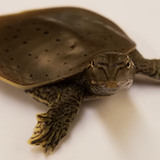News Archive
Monday, July 26 2021
-
New study sheds light on function of sex chromosomes in turtles
A new study led by an Iowa State University scientist sheds light on how organisms have evolved to address imbalances in sex chromosomes. The study looks at a species of softshell turtle, but the results could help to illuminate an important evolutionary process in many species. The research centers on a process known as sex chromosome dosage compensation.
-
A wild hair: Using hair to gauge stress response in pigs
Researchers at Iowa State University aim to use hair samples from pigs to identify genetics related to stress response. The effort could help produce pigs that lead less stressful lives and are more productive. And it all starts with a quick haircut.
-
Iowa State sets $559.1 million external funding record, including federal COVID aid
Iowa State University attracted a record $559.1 million in external funding for fiscal year 2021, including $231.1 million in sponsored research funding and $90.2 million in federal COVID-19 relief funding. Research projects winning support last fiscal year included studies of rural broadband, ultra-precision agriculture, coronavirus testing and technology for individualized cancer treatments.
-
Iowa State STEM outreach programs join forces to expand reach across state
Seven years and 80,000 people later, Iowa State University’s design and STEM outreach program FLEx is expanding its reach even more to include undergraduate student role models who are traveling the state to inspire Iowa's K-12 youth.
-
Studying how microbiome affects immunity could improve vaccine effectiveness
A new grant will help Iowa State University researchers figure out how the microbiome, or all the microorganisms that live inside and on human systems, affects immunity and the effectiveness of vaccines. Not everyone responds to vaccines in identical ways, and the researchers will search for ways humans can adjust their microbiomes to optimize vaccine response.
-
Sleep-deprived individuals less forthcoming with information about criminal history
During the course of a criminal investigation, it is common for investigators to interview individuals who are exhausted and have had little sleep. While unavoidable in some cases, a new Iowa State University study found sleep disruption or deprivation may limit the amount of information provided during an interview.







